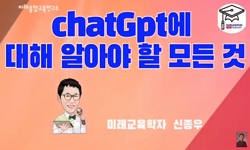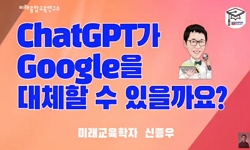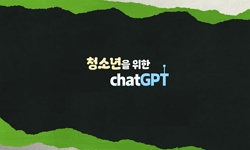This study examines the educational potential of generative artificial intelligence based on an analysis of the perception of ChatGPT's usefulness by university students who used ChatGPT to generate topics for research reports. Thirty students (partic...
http://chineseinput.net/에서 pinyin(병음)방식으로 중국어를 변환할 수 있습니다.
변환된 중국어를 복사하여 사용하시면 됩니다.
- 中文 을 입력하시려면 zhongwen을 입력하시고 space를누르시면됩니다.
- 北京 을 입력하시려면 beijing을 입력하시고 space를 누르시면 됩니다.

생성형 인공지능 시대의 글쓰기 교육 방향 모색 - ‘쓰기 전 단계’에서 ChatGPT 활용에 대한 대학 학습자의 효용성 인식 분석을 중심으로 - = How to Teach Writing in the Age of Generative AI Reimagining Writing Instruction -Focusing on the analysis of university learners' perceptions of the utility of utilizing ChatGPT in the ‘pre-writing stage’-
한글로보기https://www.riss.kr/link?id=A108924504
-
저자
주민재 (명지대학교)
- 발행기관
- 학술지명
- 권호사항
-
발행연도
2023
-
작성언어
Korean
-
주제어
Generative AI ; ChatGPT ; how it affects writing ; recognizing the utility of ChatGPT in writing ; and Concerns about decline in creativity and complex thinking skills due to use of ChatGPT ; 생성형 인공지능 ; ChatGPT ; ChatGPT 활용이 글쓰기에 미치는 영향 ; 글쓰기에서 ChatGPT 활용의 효용성 인식 ; ChatGPT 활용에 의한 창의력과 복합적 사고력 쇠퇴의 우려
-
등재정보
KCI등재
-
자료형태
학술저널
-
수록면
71-103(33쪽)
- DOI식별코드
- 제공처
-
0
상세조회 -
0
다운로드
부가정보
다국어 초록 (Multilingual Abstract)
However, participants tended to disagree on some of the interview questions. The biggest division of opinion was on the creativity of the topics. Thirteen of the participants felt that ChatGPT helped them generate more creative topics by presenting them with ideas they hadn't thought of before, while another 13 felt that using ChatGPT was not associated with more creative topic selection. Those who rated it negatively perceived that ChatGPT's wide range of ideas and related materials to choose from actually limited their creativity, or that the ideas provided were not of high quality. While most of the participants had positive perceptions about whether using ChatGPT gave them confidence in selecting topics for their reports and improved their academic writing skills, three participants each felt that it did not particularly increase their confidence or contribute to an overall improvement in their writing skills. Finally, the participants applied the useful results of ChatGPT to generating ideas and selecting specific topics for their research reports, and they perceived this process to be more efficient in terms of time and effort than before using ChatGPT.
This study suggests that the analysis of learners' perceptions of the usefulness of using generative AI in the writing process requires in-depth consideration and multifaceted analysis of the possibility that writing will become more prone to composite 'editing' in the future. As the use of generative AI becomes more common, research and development of specific educational contents and methods that can secure the usefulness of AI and realize it educationally while activating creativity to the maximum extent should be continuously conducted.
This study examines the educational potential of generative artificial intelligence based on an analysis of the perception of ChatGPT's usefulness by university students who used ChatGPT to generate topics for research reports. Thirty students (participants) in the <Writing> course at University A used ChatGPT (ver. 3.5), which they had learned how to use beforehand, to individually set the topic and purpose of their research report, and wrote and submitted it according to the form provided in advance. Afterward, written interviews were conducted to describe the participants' opinions on the impact of using ChatGPT on setting the topic and purpose of the research report. The face-to-face interviews centered on four areas: "The impact of using ChatGPT on the topic selection process," "The difference between the participants' expectations of ChatGPT and the actual results," "The difference between using ChatGPT in topic selection before and after," and "The expected impact of using ChatGPT on their writing skills. All but one of the participants found ChatGPT to be useful in selecting topics for their research reports. The participants were positive about the usefulness of ChatGPT in improving the efficiency of topic selection, such as generating and refining ideas and reducing search time. Participants reported that they were able to reduce the time and effort required to select a topic by receiving materials faster than searching the Internet, or by obtaining relevant ideas beyond their scope of thought.
However, participants tended to disagree on some of the interview questions. The biggest division of opinion was on the creativity of the topics. Thirteen of the participants felt that ChatGPT helped them generate more creative topics by presenting them with ideas they hadn't thought of before, while another 13 felt that using ChatGPT was not associated with more creative topic selection. Those who rated it negatively perceived that ChatGPT's wide range of ideas and related materials to choose from actually limited their creativity, or that the ideas provided were not of high quality. While most of the participants had positive perceptions about whether using ChatGPT gave them confidence in selecting topics for their reports and improved their academic writing skills, three participants each felt that it did not particularly increase their confidence or contribute to an overall improvement in their writing skills. Finally, the participants applied the useful results of ChatGPT to generating ideas and selecting specific topics for their research reports, and they perceived this process to be more efficient in terms of time and effort than before using ChatGPT.
This study suggests that the analysis of learners' perceptions of the usefulness of using generative AI in the writing process requires in-depth consideration and multifaceted analysis of the possibility that writing will become more prone to composite 'editing' in the future. As the use of generative AI becomes more common, research and development of specific educational contents and methods that can secure the usefulness of AI and realize it educationally while activating creativity to the maximum extent should be continuously conducted.
참고문헌 (Reference)
1 권순희, "작문교육론" 사회평론아카데미 2018
2 주민재, "생성 인공지능의 출현과 글쓰기 교육의 관계에 대한 고찰" 한국현대문예비평학회 (79) : 243-272, 2023
3 장성민, "생성 인공지능 기술은 인간의 쓰기 능력을 대신할 수 있는가? - 포스트 챗GPT 시대의 작문 평가 담론을 위한 예비적 논의 -" 한국어교육학회 (181) : 119-160, 2023
4 오선경 ; 장미정 ; 박정은, "대학 글쓰기에서의 생성형 AI 활용 윤리에 대한 학부생 인식 연구" 한국 리터러시 학회 14 (14): 69-96, 2023
5 오선경, "대학 교양 글쓰기에서의 챗GPT 활용 사례와 학습자 인식 연구" 한국교양교육학회 17 (17): 11-23, 2023
6 Daniel Herman, "The End of High-School English"
7 Emily Flower, "The College Essay is Dead: : Academics react to ChatGPT"
8 Daniel Herman, "High-School English Needed a Makeover Before ChatGPT"
9 Jennifer A. Kingson, "Friend of foe? Teachers debate ChatGPT"
10 Kevin Roose, "Don't Ban ChatGPT in Schools, Teach With it"
1 권순희, "작문교육론" 사회평론아카데미 2018
2 주민재, "생성 인공지능의 출현과 글쓰기 교육의 관계에 대한 고찰" 한국현대문예비평학회 (79) : 243-272, 2023
3 장성민, "생성 인공지능 기술은 인간의 쓰기 능력을 대신할 수 있는가? - 포스트 챗GPT 시대의 작문 평가 담론을 위한 예비적 논의 -" 한국어교육학회 (181) : 119-160, 2023
4 오선경 ; 장미정 ; 박정은, "대학 글쓰기에서의 생성형 AI 활용 윤리에 대한 학부생 인식 연구" 한국 리터러시 학회 14 (14): 69-96, 2023
5 오선경, "대학 교양 글쓰기에서의 챗GPT 활용 사례와 학습자 인식 연구" 한국교양교육학회 17 (17): 11-23, 2023
6 Daniel Herman, "The End of High-School English"
7 Emily Flower, "The College Essay is Dead: : Academics react to ChatGPT"
8 Daniel Herman, "High-School English Needed a Makeover Before ChatGPT"
9 Jennifer A. Kingson, "Friend of foe? Teachers debate ChatGPT"
10 Kevin Roose, "Don't Ban ChatGPT in Schools, Teach With it"
11 DITCH THAT TEXTBOOK, "ChatGPT, Chatbots and Artificial"
12 노대원 ; 홍미선, "ChatGPT 글쓰기 표절 대응과 교육적 활용 전략" 국어교육학회(since1969) (82) : 71-102, 2023
13 Kalley Huang, K., "Alarmed by A.I. Chatbots, Universities Start Revamping How They Teach"
동일학술지(권/호) 다른 논문
-
- 돈암어문학회
- 김준현
- 2023
- KCI등재
-
포스트휴먼의 글쓰기, 창작인가 조합인가? -‘생성형 AI’를 활용한 소설 창작에 관한 고찰-
- 돈암어문학회
- 김소륜
- 2023
- KCI등재
-
최인호 초기소설에 나타난 공포와 일탈의 감각 -바르트의 ‘중립’ 개념을 중심으로-
- 돈암어문학회
- 고경선
- 2023
- KCI등재
-
1950년대 영화 문화 양상과 대중적 전유 : 잡지 『아리랑』을 중심으로
- 돈암어문학회
- 한영현
- 2023
- KCI등재




 DBpia
DBpia






